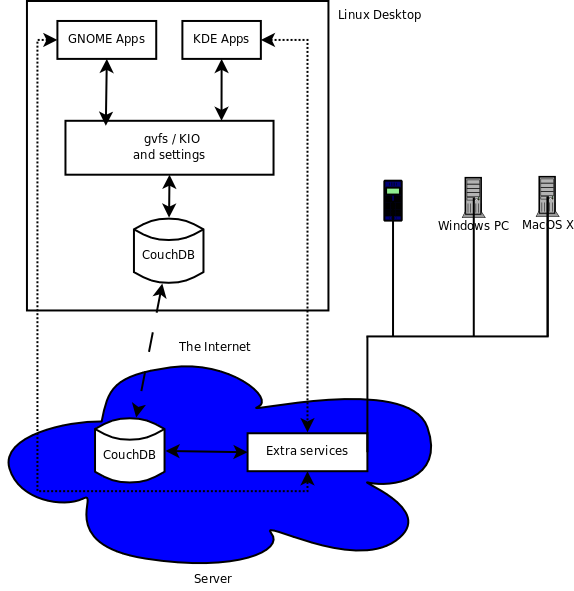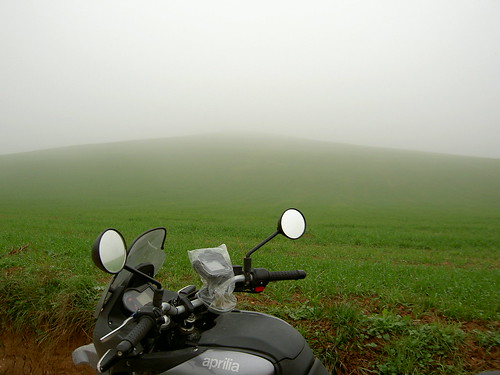After an exhausting week at GCDS, a similarly exhausting weekend partying in Pamplona for San Fermín, and an again exhausting return to day to day work, just found some time to write some notes from last GCDS.
- First, about RMS’s talk. I really didn’t find offensive his comments, just was a bit upset by the way he answered some of the questions asked by some people (this is a stupid question or something like that was one of his answers), but well, I can live with that and didn’t feel offended at all. But I found his talk very, very (did I say very?) boring. Talking about how cool is free software in front of an audience of free software enthusiasts, and about the history of GNOME and KDE in front of many of the core contributors to those projects was, IMHO, a total waste of time. While the talk is great for other audiences, it was totally out of place at GCDS. And that’s all I have to say about this, no meme from me.
- There was a lot of interest on CouchDB from many people:
- Tracker guys might want to use it to store metadata and files.
- Roberto Majadas, the newest incorporation to the GNOME Hispano board, has been working on Vala bindings for my couchdb-glib library. He should announce them soon, I think.
- Henri, from Midgard, implemented, while in Gran Canaria, the replication protocol used by CouchDB for Midgard, which means you would be able to sync (contacts, bookmarks, notes, etc) not only to CouchDB servers, but also to any server running Midgard.
- People liked a lot (at least they applauded a lot) the demos for the stuff we’ve doing for bookmarks (Firefox) and contacts (Evolution and Akonadi) storage in CouchDB, that Steve Alexander showed in his talk on Wednesday. Thanks BTW to Ryan Lortie, who kindly gave his slot for his gnio talk so that Steve could talk about our work.
- About GNOME 3 technologies, I have to say that the platform changes seem to be very well on track (thanks to Andre Klapper for keeping track), and GNOME Shell looks really good, even though it seems to still miss some functionality (applets? notifications?), which I’m sure the people working on it will settle down. Not so sure about Zeitgeist. It looks really great, don’t misinterpret me, but after thinking about it for a while, I couldn’t imagine how it would be useful for me, given how I access files. I’m sure it would be quite useful for lots of people, I’m just talking about me, but I think it would make a lot of sense if, instead of a separate application, it were a Nautilus view, just like you have the icon, list and compact views. But well, I’ll try testing it soon and maybe I’ll get convinced.
- I liked a lot the Telepathy tubes stuff for desktop sharing, as well as the libnice talk by Youness Alaoui. These 2 open the door for very nice things to be added to desktops in the not-so-distant future.
- I talked with several people about the contents of the conference, and most people agreed that, for someone that follows GNOME development the whole year, most talks are useless. Not that they are not interesting, because they are, but it would be much more useful if they were replaced with discussion groups that came up with plans for the next development cycles. Talks are still ok for new people getting to the conference, but having BOFs just after the core days, where a big percentage of the attendees are already gone, is, IMO, not a good idea, they should really be part of the core days. UDS (Ubuntu Developer Summit) has this right IMO, where there are only a few keynotes, and then several rooms hosting those discussions for different topics, where people come up with clear plans of what they should be working on. I hope we can do something similar for next year.
- And after complaining about too many talks, I have to say that one of the best things in the conference (along with the GNOME 1, 2, 3 talk by Fernando Herrera and Xan López), at least for me, was the Pitivi tutorial, by Edward Hervey, which showed to the profanes like me how to do nice videos. I hope I’ll be able to follow his teachings and, soon, publish some nice videos of my motorbike and skiing rides as well as my holidays, with good rock&roll as the soundtrack 🙂 That, along with Mistelix (a DVD authoring tool) might change radically the way my friends and family enjoy my photos and videos.
- Federico was selected as the first GNOME Hispano honorific member in the GNOME Hispano dinner on Thursday. It’s just a honorific title (accompanied by a bottle of local rhum as the prize 🙂 ), but he really deserves anything we can do to show him our admiration to the best hacker I’ve ever worked with.
- I missed the FreeFA tournament, because playing football at 3PM under the Canarian sun is something my religion forbids 🙂 But yeah, even with me not playing, Bastien lost again 😀
- Also nice was to have the personal hobbies lightning talks on Tuesday. As I discussed with some people, sexist problems, IMO, might be solved if some people, instead of being all the time in front of a computer, got out once in a while and met some non-geeky people (including women, of course) and share some hobby with them. That might make them understand better how to behave in front of women or people with different cultures. So I hope mega geeky people in the audience used those lightning talks as a starting point to find non-technology hobbies.
- I really missed more KDE<->GNOME cooperation talks. Most of the cross-desktop talks were about things specific to one or the other desktop, not about how both projects could cooperate more. At the end, except in parties, it was hard to find KDE people (at least I only saw the KDE people I know in parties) around, and I guess the KDE people had the same impression. We even had 2 separate parties one day!!! Have to say though that the GNOME one was funnier, as some KDE people that showed up at the GNOME one told me 😀
Last but not least, as always, meeting again all the people I already know and making new friends is the best part of this kind of events. It makes you feel again part of a great community.
And to finish, a big thanks to the people that helped in the organization. They already had a big round of applause at the GNOME Foundation Annual Meeting, but I’ll say it again here: thanks a lot!


